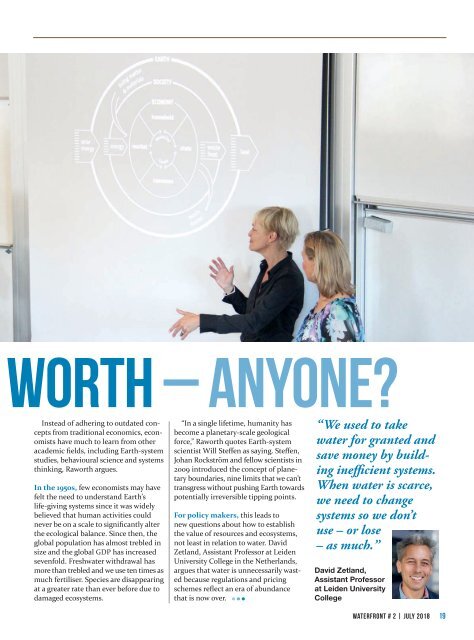Stockholm WaterFront no 2, 2018
In the new issue of WaterFront, we look at the connections between humans and nature. It is an exciting moment in time, when the traditional view on the relationship between ecosystems and human development is increasingly being challenged. In the past, nature has at times been seen as a foe to be conquered, but we’re now starting to realize that nature in fact holds the key to solving many of humanity’s most pressing challenges. Yet, the shift is not happening fast enough. Investment in nature-based solutions and ecosystems research is clearly insufficient. To hopefully help speed things up, this year’s World Water Week will explore some of these issues through its theme Water, ecosystems and human development. In this issue of WaterFront we examine the alarming threat to the world’s major aquifers on page 4. Still, there is also a lot of good news, with signs of a global rethink – on page 12 you can read about how the World Bank wants to bring ecological expertise into their projects at an earlier stage and a story on page 14 explores new tools that help infrastructure planners calculate climate risks. To learn more about how economists are trying to bring ecosystems into the equation, turn to page 18. Last, but not least, don’t miss Torkil Jønch Clausens’ analysis of what really happened at the High-level Political Forum on page 22. Enjoy the read!
In the new issue of WaterFront, we look at the connections between humans and nature. It is an exciting moment in time, when the traditional view on the relationship between ecosystems and human development is increasingly being challenged. In the past, nature has at times been seen as a foe to be conquered, but we’re now starting to realize that nature in fact holds the key to solving many of humanity’s most pressing challenges.
Yet, the shift is not happening fast enough. Investment in nature-based solutions and ecosystems research is clearly insufficient. To hopefully help speed things up, this year’s World Water Week will explore some of these issues through its theme Water, ecosystems and human development.
In this issue of WaterFront we examine the alarming threat to the world’s major aquifers on page 4.
Still, there is also a lot of good news, with signs of a global rethink – on page 12 you can read about how the World Bank wants to bring ecological expertise into their projects at an earlier stage and a story on page 14 explores new tools that help infrastructure planners calculate climate risks. To learn more about how economists are trying to bring ecosystems into the equation, turn to page 18.
Last, but not least, don’t miss Torkil Jønch Clausens’ analysis of what really happened at the High-level Political Forum on page 22.
Enjoy the read!
Create successful ePaper yourself
Turn your PDF publications into a flip-book with our unique Google optimized e-Paper software.
WORTH – ANYONE?<br />
Instead of adhering to outdated concepts<br />
from traditional eco<strong>no</strong>mics, eco<strong>no</strong>mists<br />
have much to learn from other<br />
academic fields, including Earth-system<br />
studies, behavioural science and systems<br />
thinking, Raworth argues.<br />
In the 1950s, few eco<strong>no</strong>mists may have<br />
felt the need to understand Earth’s<br />
life-giving systems since it was widely<br />
believed that human activities could<br />
never be on a scale to significantly alter<br />
the ecological balance. Since then, the<br />
global population has almost trebled in<br />
size and the global GDP has increased<br />
sevenfold. Freshwater withdrawal has<br />
more than trebled and we use ten times as<br />
much fertiliser. Species are disappearing<br />
at a greater rate than ever before due to<br />
damaged ecosystems.<br />
“In a single lifetime, humanity has<br />
become a planetary-scale geological<br />
force,” Raworth quotes Earth-system<br />
scientist Will Steffen as saying. Steffen,<br />
Johan Rockström and fellow scientists in<br />
2009 introduced the concept of planetary<br />
boundaries, nine limits that we can’t<br />
transgress without pushing Earth towards<br />
potentially irreversible tipping points.<br />
For policy makers, this leads to<br />
new questions about how to establish<br />
the value of resources and ecosystems,<br />
<strong>no</strong>t least in relation to water. David<br />
Zetland, Assistant Professor at Leiden<br />
University College in the Netherlands,<br />
argues that water is unnecessarily wasted<br />
because regulations and pricing<br />
schemes reflect an era of abundance<br />
that is <strong>no</strong>w over.<br />
“We used to take<br />
water for granted and<br />
save money by building<br />
inefficient systems.<br />
When water is scarce,<br />
we need to change<br />
systems so we don’t<br />
use – or lose<br />
– as much.”<br />
David Zetland,<br />
Assistant Professor<br />
at Leiden University<br />
College<br />
WATERFRONT # 2 | july <strong>2018</strong><br />
19


















